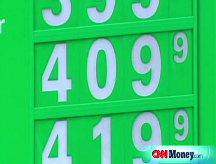Dollar mixed in early trading
Greenback gains vs. euro and eases vs. yen amid record oil prices and a weak stock market.
NEW YORK (CNNMoney.com) -- The dollar was mixed against other major currencies Monday as oil prices surged and the stock market flirted with bear market territory.
Currency traders were also awaiting the ECB's decision on interest rates and a key report on health of the U.S. job market.
The 15-nation euro bought $1.5782 in early trading, down from $1.5790 late Friday. The British pound rose to $1.9942 from $1.9930 in the previous session. The dollar slipped to ¥105.82 from ¥106.12 last week.
"The dollar is off its lows but that doesn't mean anything," said Ashraf Laidi, chief currency analyst at CMC Markets in New York. "We'll have to wait and see what happens with U.S. stocks."
Stocks were battered last week by a combination of rising oil prices, a weak dollar and more financial woes. On Friday, the Dow Jones industrial average briefly fell into bear territory, or to levels at least 20% below their highs from last fall.
The major indexes were mixed in early trading.
Meanwhile, the price of oil jumped to an all-time high of $143.67 in pre-market electronic trading.
The weak dollar has been blamed for pushing oil prices higher, and high oil and gas prices have been blamed for boosting inflation. Higher inflation is a drag on the economy and further weakens the dollar.
"The fundamentals are exceedingly adverse against the dollar," Laidi said.
The dollar may come under additional pressure Thursday when the European Central Bank makes its decision on interest rates and the U.S. government releases data on the labor market.
The European Union's statistics agency reported Monday morning that inflation in the EU rose to a high of 4% in June. That helped support the widely held expectation that the ECB will hike rates on Thursday to 4.25% from 4% to combat rising prices.
A rate hike by the ECB would strengthen the euro and weigh on the dollar.
The Labor Department's report on nonfarm payrolls for June is also due on Thursday and is expected to show that the nation's economy lost 60,000 jobs after a loss of 49,000 jobs in May, according to consensus estimates from Briefing.com.
But the same report is also expected to show that the nation's unemployment rate eased from 5.5% to 5.4%.
A weak labor market hurts the dollar because it suggests that the U.S. economy will continue to falter. ![]()



